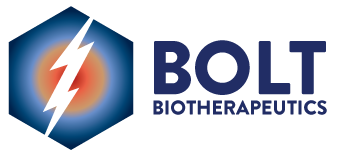
Our Pipeline

Our Pipeline
We are targeting urgent unmet patient needs with our innovative approach.
Non-small Cell Lung Cancer, Melanoma, & Other Solid Tumors
Phase 1
Gastric Cancer
Preclinical
Colorectal Cancer, Non-small Cell Lung Cancer
Preclinical
Solid Tumors
Preclinical

Funds 3 bispecific Boltbody ISACs through early clinical development

(Caprin-1 ISAC)
Funds Boltbody ISAC targeting Caprin-1 through early clinical development
BDC-3042
BDC-3042 is a first-in-class antibody that reprograms tumor-associated macrophages (TAMs) to attack tumor cells. BDC-3042 is a monoclonal antibody that binds to and agonizes dectin-2, a cell surface protein on tumor-supportive macrophages. The activation of these macrophages results in the production of pro-inflammatory cytokines, consistent with the characteristics of tumor-destructive macrophages. BDC-3042 has the potential to turn tumor-supportive macrophages into tumor-destructive macrophages to elicit a productive anti-tumor immune response.
BDC-4182
BDC-4182 is a next-generation BoltbodyTM ISAC targeting claudin 18.2, a clinically validated target with expression in gastric cancer, gastroesophageal junction cancer, pancreatic cancer, and other tumor types. In preclinical models, BDC-4182 demonstrated significant anti-tumor activity in low claudin 18.2 expressing models, induced immunological memory and outperformed cytotoxic claudin 18.2 ADCs. BDC-4182 was tolerated in non-human primates at the highest dose tested (12mg/kg). BDC-4182 clinical trial initiation is anticipated in 2Q2025.
CEA ISAC
CEA refers to a specific carcinoembryonic antigen cell adhesion molecule also known as CEACAM-5 that is commonly found in gastrointestinal cancers such as colorectal cancer. Our lead CEA-targeted ISAC comprises a novel, fully human antibody with high affinity and selectivity to CEA, and not to other members of the CEACAM family, conjugated to a proprietary next-generation TLR7/8 agonist via a non-cleavable linker. This ISAC drives efficient phagocytosis of CEA-positive tumor cells by myeloid cells and stimulates production of critical immune-activating cytokines including IL-12p70, IFNg, and TNFa. In vivo, tumor growth inhibition in xenograft models demonstrates induction of myeloid cell-mediated anti-tumor activity. In a CEA transgenic syngeneic mouse model, treatment with our lead ISAC results in complete tumor regression with development of immunological memory and epitope spreading as demonstrated by failure of CEA-positive cell line and CEA-negative parental cell line to form tumors upon rechallenge.
PD-L1 ISAC
Our PD-L1 ISAC utilizes a novel human anti-PD-L1 antibody conjugated to a next-generation TLR7/8 agonist payload via a non-cleavable linker. This ISAC leverages a unique mechanism of action due to its ability to target both tumor and immune cells that express PD-L1. Preclinical studies show that it can directly activate PD-L1-positive antigen-presenting cells resulting in the secretion of pro-inflammatory cytokines and stimulation of powerful T cell responses. In vivo, the PD-L1 ISAC elicits complete tumor regression and immunological memory in multiple syngeneic models. Mechanistic studies have demonstrated that our PD-L1 ISAC can generate complete responses in models where PD-L1 is only expressed on the immune cells, as well as in models where PD-L1 is only expressed on the tumor cells.
